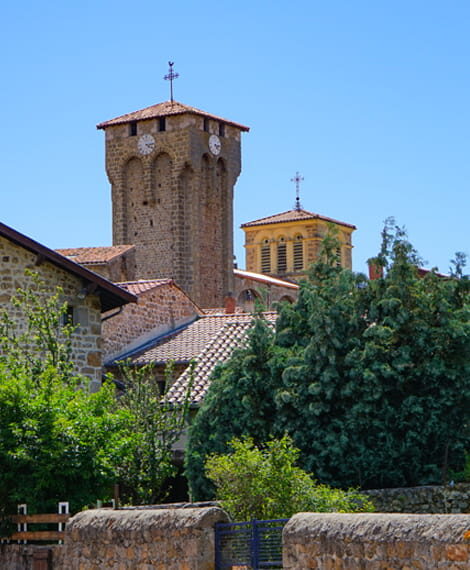With 87 towns and villages, Loire Forez is one of the largest local council communities in France. Discover our towns and villages, then succumb to the charming history and the beauty of each one. They all contribute in their own way to making Loire Forez a must-visit destination.
Montbrison, historic capital of Forez
One of the largest heritage centres in the Loire with 18 listed or classified monuments.
From streets to alleys, from cloisters to courtyards, from chapels to collegiate churches, the Forez capital reveals itself step by step… History… Nothing better than a stroll to discover the traces of this rich past. Explore with the document “Laissez-vous conter Montbrison”.
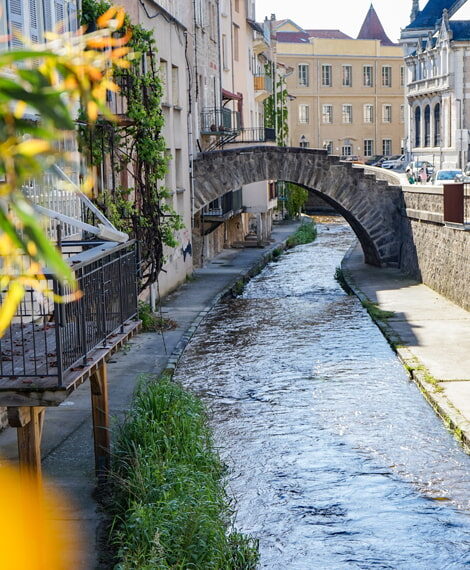
Montrond-les-Bains
With its mineral water resources and its location on the Loire River, it is also a town of well-being and relaxation, thanks to its healthcare and wellness establishments (Thermal Spa, Les Iléades…), as well as its gaming and gastronomy offerings. As a heritage town with its medieval castle and two churches, it is also a place of culture and major events, such as the Medieval Festival. If you are seeking well-being, relaxation, and leisure, Montrond-les-Bains is the ideal destination for your stay!
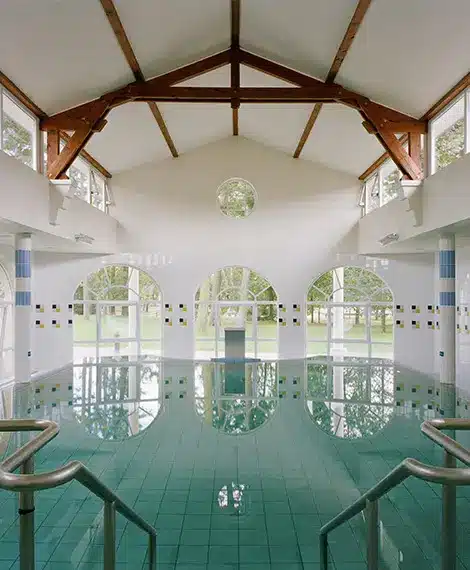
Saint-Bonnet-le-Château, a village with character
Stroll through the cobbled streets of the historic district and discover its 15th and 16th century bourgeois houses, then climb up to the Collegiate Church to admire an exceptional panorama; from the Forez plain to the Massif Central, the Pilat and the Alps.
This former count’s castellany has retained part of the fortified town wall and, along its cobbled streets, are a line of bourgeois and aristocratic houses dating from the 15th and 16th centuries. The collegiate church, in Gothic style (early 15th-16th centuries), is remarkable for its size and understated style. Exceptionally large wall paintings, executed around 1425, adorn the upper church and the crypt.
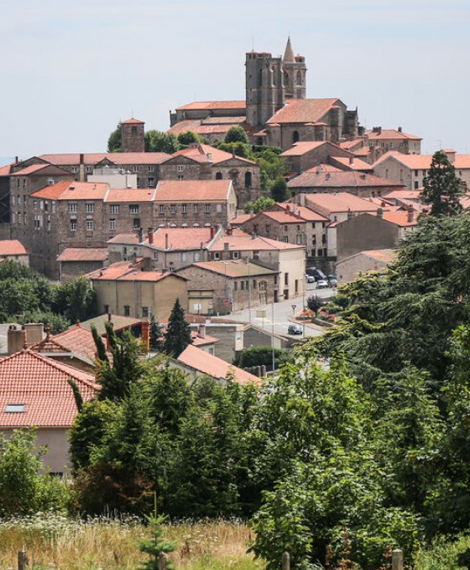
Chazelles-sur-Lyon
Thanks to its commercial, artisanal, and industrial vitality, Chazelles-sur-Lyon is an attractive center for an entire agricultural region, especially during its two weekly markets: on Tuesdays and Fridays. Proud of its hat-making tradition, it preserves its memory through its famous Hat Museum. The various workshops involved in the production chain of felt hats have been reconstructed there. Chapellerie Fléchet, the last great witness of Chazelles-sur-Lyon’s hat-making architecture, has become a Fashion, Hat, and Arts and Crafts Hub. Officially named “La Chapellerie,” it houses the Hat Workshop-Museum, along with all its activities, as well as designer studios, an event space, and a restaurant.
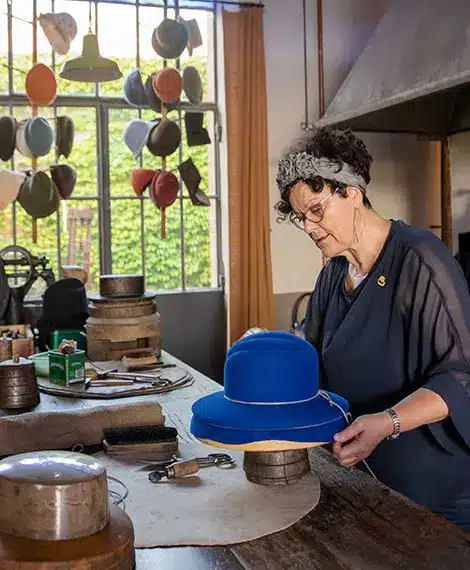
Saint Rambert – medieval quarter
Saint Rambert is rich in architectural heritage. Sites to see:
– The church of Saint-André, the largest Romanesque church in the department, which has a characteristic bell tower and a porch tower (built in the 9th century)
– The chapel of Saint-Jean which was Saint Rambert’s first church
– The “Porte Franchise”, the only gate belonging to the old enclosure still visible.
– The many half-timbered houses
– The former convent buildings of the priory which now house the Museum of Civilisation.
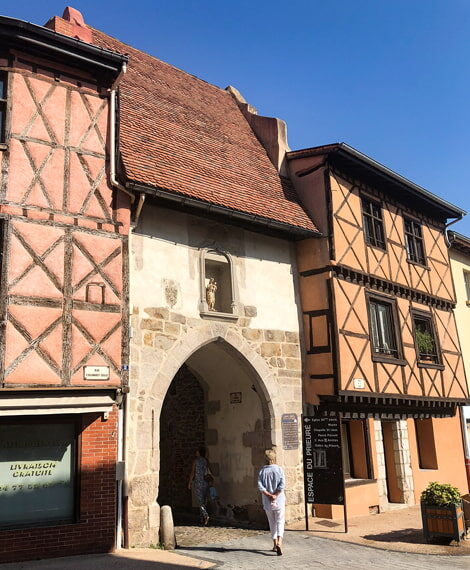
Feurs, a small town in the countryside
Located on the right bank of the Loire River, at an altitude of 346m, in the eastern part of the Forez plain, Feurs is surrounded by vast agricultural landscapes. It is surrounded by diverse aquatic environments. The soil of Feurs has yielded numerous Gallo-Roman objects and high-quality monuments that allow us to trace the history of the city, which is marked by periods of glory and destiny.
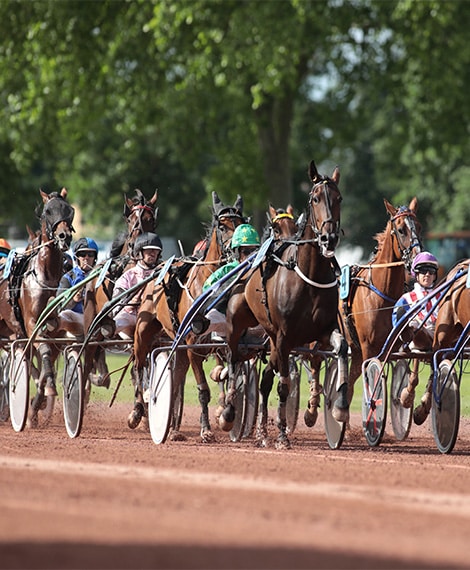
Champdieu a village with character
Champdieu gets all its character from its medieval origins. Between the hills and the plain, the village was built under the protection of the high walls of its priory and in the shadow of the two bell towers of its church. Guided tours are available to explore:
– the Romanesque church and its crypt
– the convent buildings and especially the refectory with its 15th century fresco
– the Porte Bise and the Romanesque art centre
– the old hospice (15th century)
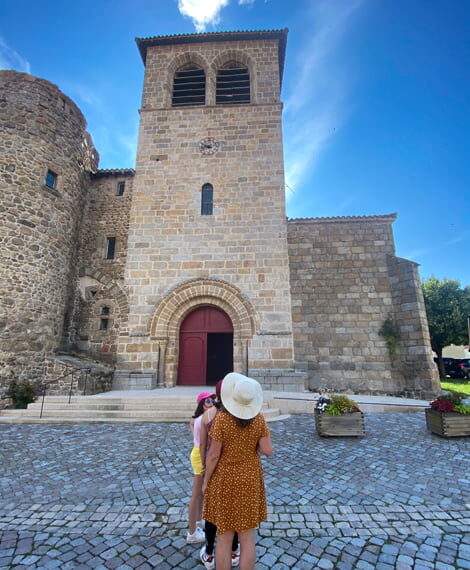
Panissières, Land of Weavers
Located on an ancien path that connected two provinces, Forez and Beaujolais, the city of Panissières developed from the 18th century onwards around the textile industry. The old walled village has transformed over the centuries into a modern city with numerous amenities.
The textile industry, deeply rooted in the history of the city, has shaped a distinctive architecture featuring numerous workshops and master houses. Allow yourself to be surprised by this city situated in the “Land of Weavers” and discover its textile heritage of the past and present through a thematic stroll, hiking along the GRP trail, or visiting its Tie and Textile Museum.
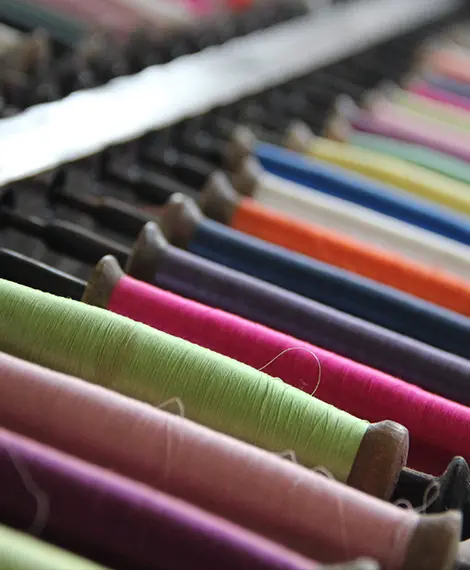
The Vieil Ecotay site – keep and church of Ecotay
The site of Vieil Ecotay is one of the most picturesque places in the Forez area. Built on a rocky outcrop, the keep next to the Romanesque church is the last remaining evidence of the Lordship of Ecotay, one of the most important of the medieval period.
Below, bordering the two rivers, the village with its stone houses and terraced gardens has retained a rare authenticity.
On a steep site, at the confluence of two rivers, the Cotayet and the Chavaran, the remains of the Ecotay keep (10th-11th centuries) stand above the village. Locally known as the King and Queen, these two sections of wall dominate the village.
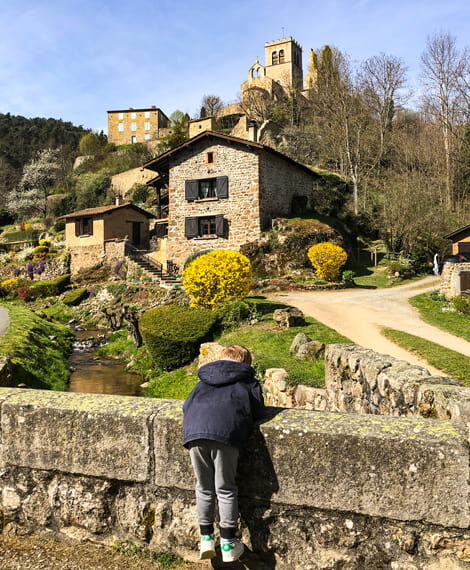
Salt-en-Donzy, medieval Site
The medieval site of Salt-en-Donzy has its history dating back to the year 1000 when the Calvi family settled here. The Donzy fortress has a rich past, having hosted the constable Charles III de Bourdon around 1523. The castle was besieged around 1593 and was dismantled in 1603 following the request of the town’s inhabitants and the order of King Henry IV. This picturesque site still abounds with ever-evolving medieval remains.
You can also explore the Romanesque church, which was originally the church of the Salt-en-Donzy priory, as well as the priory and the 4 hiking trails starting from the town hall, marked with white and yellow: 6km, 8km, the circuit of the 3 villages, and the 24km monorail circuit.
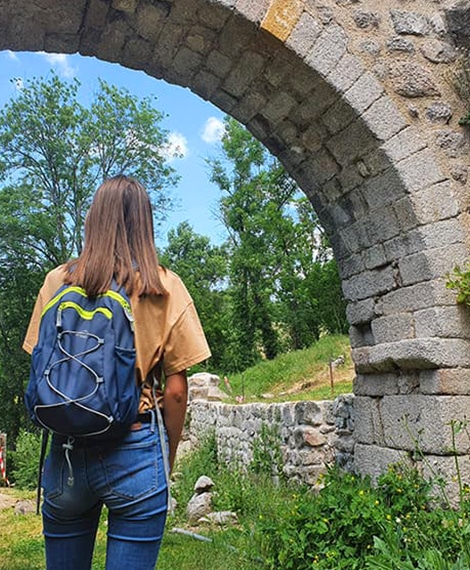
Cervières, historic village
The history of this village dates back to the 12th century, when it was part of the earldom and then the province of Le Forez. It is the history of a chateau and a little town in the middle of a clearing in the woods. Its interest lies in its beauty and quality of the local architecture, which has been exceptionally well preserved. A hundred or so houses, protected by an enclosure of which two gates, towers and walls remain, were added to the castle. Until the revolution, Cervières was the seat of an important jurisdiction: its castle was considered the best stronghold in the Forez area, bordering Auvergne.
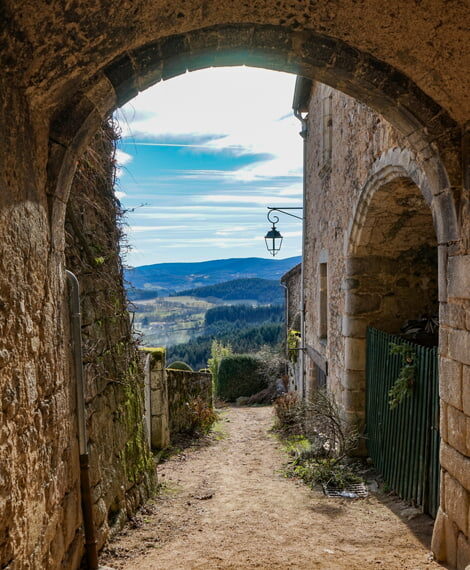
Sauvain, a village with character
With its stone houses arranged around its Gothic church, Sauvain is a typical Monts du Forez village.
The ancestral birthplace of the Fourme de Montbrison cheese, its cheese dairies and its museum continue to keep the tradition alive.
The landscape is made up of high plateaus interspersed with deep valleys, covered with moors where heather and bilberries grow. Pastoralism has been rooted here since the Middle Ages, and the moors have been populated with jasseries (farms where Fourme cheese is made), a hundred of which still exist.
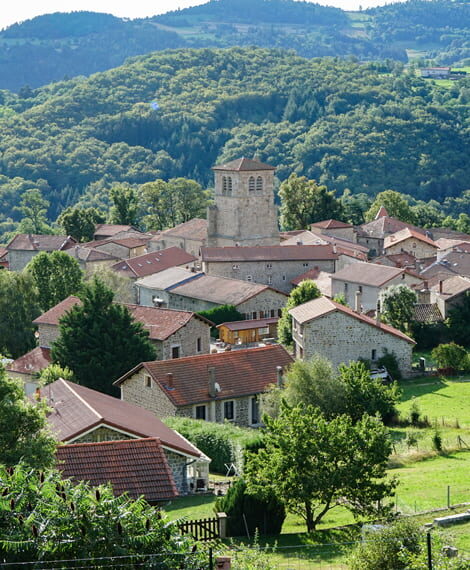
Pouilly-lès-Feurs, a medieval village
In 966, the monks from Cluny settled in Pouilly-lès-Feurs. Preserved remnants of their presence can still be observed today. Discover the Romanesque church, the priory, the ramparts, and even the 9 towers that are still visible, and let yourself be carried away by the visit of this charming village.
Outside the ramparts, other architectural gems can be seen, such as the Pravieux Castle and its charming Renaissance pavilion adorned with beautiful and diverse frescoes. Also, explore the St. Benoît, Les Odiberts, and St. Marc Hermitage chapels on a 16km loop hiking trail.
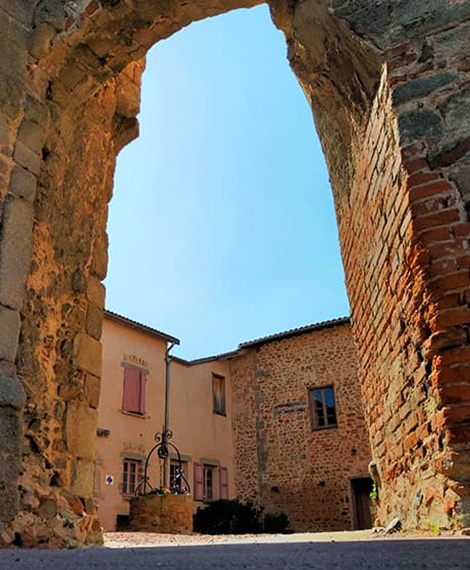
Montarcher, a village with character
Montarcher, a small village in the heart of the southern Haut-Forez, perched at 1,162 metres, offers an exceptional 360° panorama of the Velay and Forez regions.
A listed site, Montarcher is classified as a “Village with Character” and has remarkable heritage. Montarcher has long attracted walkers. After the climb, admire the panorama, visit the beautiful hilltop church whose choir dates from the 12th century, discover the remains of the old medieval castle and enjoy its invigorating air and charm.
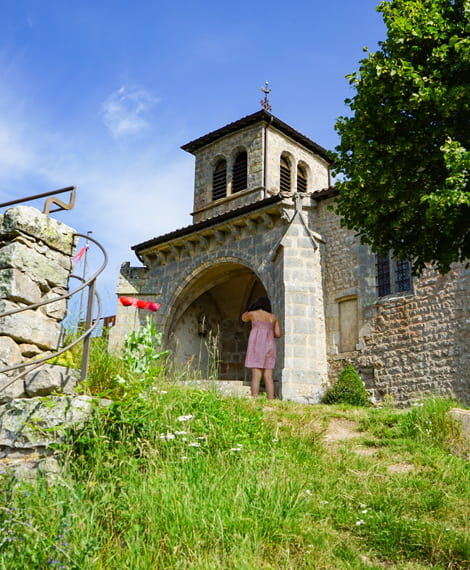
Saint Marcellin en Forez, a fortified medieval village
Formerly a castellany of the Counts of Forez, the imposing remains of St Marcellin’s ramparts from its past as a “bourg castral” have been preserved. The space that the ramparts demarcate was where the old village, which was built around the church, was concentrated. Sites to see:
– the House of the Armorial (14th century) and its museum area
– the Romanesque church (12th century)
– the chapel of Sainte Catherine (12th century)
– the ramparts
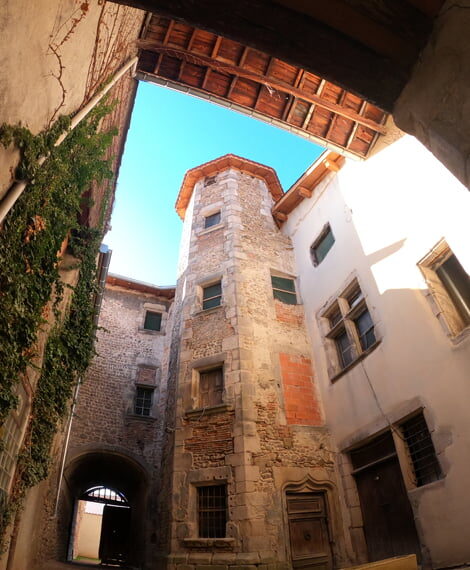
Marols, a village with character
Located in the Forez mountains, in the heart of the Auvergne Rhône Alpes region, Marols is a thousand-year-old town built around its hamlets. Classified as a village with character by the Loire department, Marols also stands out due to the beauty of its natural environment and the proximity of the leading towns in the region.
Facing a majestic panorama, the fortified church now marks the centre of a place for encounters, between tradition, modernity and a gentle way of life.
